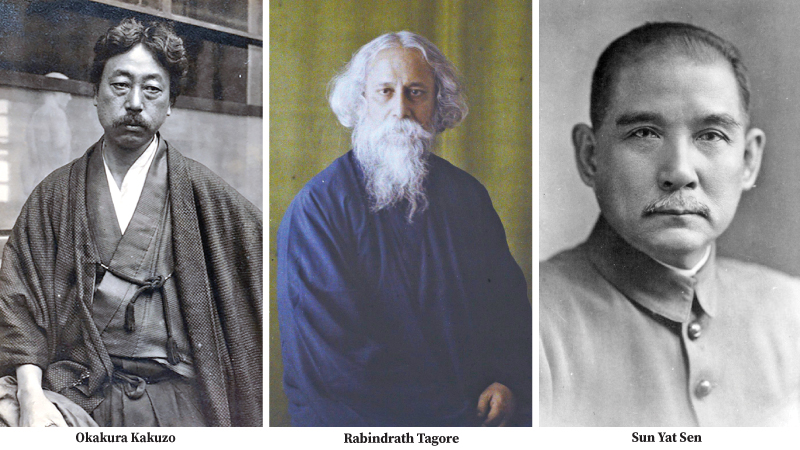 For over two-thousand years, the West – whether under Roman Emperors, Crusader Kings, Tsars or democrats have struggled with the presence of the Jewish people. From the Shtetls of Eastern Europe to the gas chambers of Auschwitz, anti-semitism became a tragic cornerstone of Western religious, political and social ideology. Even in this aftermath, the creation of a Jewish State in Palestine birthed a new conflict – this time displacing others in the name of healing a Western trauma.
For over two-thousand years, the West – whether under Roman Emperors, Crusader Kings, Tsars or democrats have struggled with the presence of the Jewish people. From the Shtetls of Eastern Europe to the gas chambers of Auschwitz, anti-semitism became a tragic cornerstone of Western religious, political and social ideology. Even in this aftermath, the creation of a Jewish State in Palestine birthed a new conflict – this time displacing others in the name of healing a Western trauma.
Asia, by contrast, has no such legacy. In India, the Jewish communities of Kerala and Mumbai preserved their traditions while living in harmony with their neighbours. Even today, the last Jewish synagogues in Kolkata are maintained by Muslim caretakers. In China, the Jews of Kaifeng were not only tolerated but respected, their customs fused by local flavours rather than fear. No inquisitions. No pogroms.
It is time we reflect on what this contrast reveals: the “Jewish problem” was never a Jewish problem. It was a Western civilisational failure — a symptom of a culture that, in seeking purity, destroyed plurality.
And now, that failure is unravelling.
In the US and Europe, liberal democracy is cracking under its own contradictions. Political chaos, populist backlash, algorithmic tribalism, and hollowed-out institutions have eroded public trust. Footage from American cities shows protestors clashing with the State – Police cars torched and department stores looted in broad daylight.
Even Western academics said that the clock is ticking. Professor of War in the Modern World, David Betz of King’s College London said that many European countries now exhibit signs of being in a pre-civil war state. His research showed there is a statistically significant chance of a war breaking out in the next five years in a Western state.
Once hailed as the pinnacle of human governance, the Western model now suffers from what Confucian thought would call a collapse of ‘li’ — the rituals, relationships, and responsibilities that bind society together.
In this moment of global flux, Asia must not follow the West’s descent into chaos. Instead, Asia must remember what it has always known: the moral centrality of harmony, virtue, and right relationship.
The forgotten pan-Asian vision
At the turn of the 20th century, a Japanese philosopher and scholar named Okakura Tenshin (Kakuzō) declared a revolutionary truth: “Asia is one.” In his seminal work The Ideals of the East, Okakura wrote that Asia’s unity was not based on blood or borders, but on a shared civilisational spirit which prized balance, aesthetic refinement, and spiritual integrity over dominating the other.
Okakura was no mere romantic. He was deeply political. He travelled to India, collaborated with Rabindranath Tagore, and laid the philosophical groundwork for a Pan-Asian awakening — a cultural alliance that could resist Western domination not by arms alone, but by reasserting values that had made Asian civilisations flourish for centuries.
That spirit was also animated by the Black Dragon Society (Kokuryūkai) — a secretive network of Japanese Pan-Asianists, diplomats, and strategists. Though later corrupted by ultra nationalism, their original vision was one of strategic solidarity: to form alliances from Japan to the Middle East, to support liberation movements, and to build an Asia no longer at the mercy of Western imperialism.
These were the earliest dreamers of an Asian modernity rooted in ancient wisdom — not a copy of the West, but an answer to its failings.
A Confucian alternative
What makes the Asian alternative viable today is not merely its economic rise, but the ethical depth of its traditions. For example, at the heart of Confucianism lies a vision of the world built not on conquest or contract, but on benevolence, righteousness, and ritual propriety.
These are not abstract ideals; they are living principles that guide personal behaviour, social hierarchy, and political legitimacy.
In contrast to the Western emphasis on individual autonomy, Confucianism begins with relationship. The person is never atomised, but always embedded — in family, in society, in history. Power is not legitimate unless it serves the people and upholds virtue. A ruler must first master himself before he can govern others. This is echoed by Sun Yat Sen, the Father of modern China, “Only by the unification of all the peoples in Asia on the foundation of benevolence and virtue can they become strong and powerful.”
At its core, Asia possesses the remedy for the age-old political question whether the individual should be reconciled with the collective or vice versa. However, our ways have been dismissed by the West as “Superstitions” and “Despotism”. Despite the red herring issues and lack of civic sense that plagues Asia, on closer inspection, the region boasts of a history of tolerance and mutual exchange.
It is a civilisational ethic — not race, not religion, not ideology — but a shared vision that must ultimately form the basis of pan-Asian solidarity.
The return of the Silk Road spirit
In the 21st century, trade and infrastructure have once again become tools of diplomacy. China’s Belt and Road Initiative, Japan’s Indo-Pacific investments, India’s outreach to Southeast Asia, and ASEAN’s quiet multilateralism — all reflect a regional reordering.
But if this is to be more than another cold contest of influence, it must be infused with the old Silk Road ethos: commerce as cultural exchange, not colonisation. For centuries, bhikkhus, Jewish merchants, Persian artisans, and Chinese scholars crisscrossed Asia, not merely trading goods, but exchanging stories, medicines, ideas, and sacred texts. It was a world not of hegemony, but hospitality.
In this spirit, Asia can offer the world a new model of globalisation — one built not on homogenisation, but on mutual flourishing. Not the empire of fast food, hashtags, and drone strikes, but a confederation of dignified differences.
Beyond the binary
Pundits may say Asia must choose between the either the liberal model or authoritarianism. This is a false choice.
The true Asian future lies not in systems but in values. The question is not: “How free are you?” but: “What kind of person are you becoming? What kind of society are we cultivating?” These are the questions Confucius asked. These are the questions the West has forgotten.
Pan-Asianism today must be rebuilt not as a racial alliance, but as a civilisational response to the moral, spiritual, and institutional exhaustion of the West. A new world order need not be forged by war or domination. It can be built — patiently, wisely — through culture, trade, responsibility, and trust.
A turning point
We live at a turning point in history. The old powers are decaying from within. Their “universal values” have collapsed into chaos and hypocrisy. Their institutions are brittle. Their people are angry, lost, and divided.
Asia should not celebrate the West’s decline — but it must not imitate them either.
Let the words of Okakura Tenshin ring once more: “Asia is one.” Let us build a future where virtue leads policy, where hospitality guides commerce, and where the wisdom of the past lights the path forward.
We, Asians, do not need to rise, we just only need to remember.






